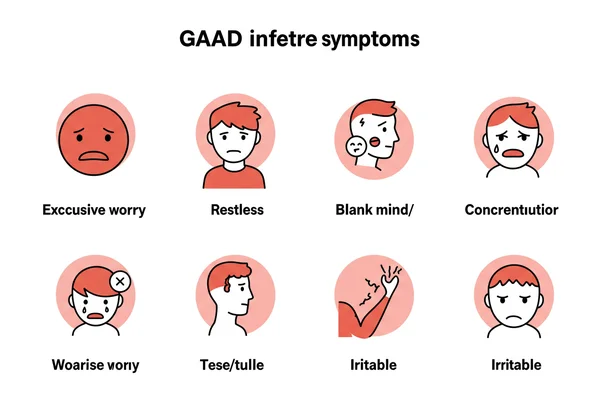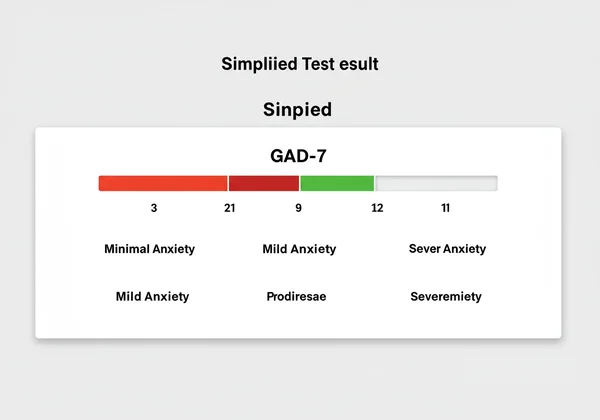Mental Health Test for Anxiety: Understanding GAD and Getting Clarity
July 13, 2025 | By Owen Buckley
Do persistent worries cast a shadow over your everyday life, making it hard to relax or focus? If you've found yourself quietly wondering, 'Am I dealing with a mental health disorder?', know that countless others share that question. This guide will help you unpack generalized anxiety disorder (GAD), explore its common signs and causes, and show how a tool like our GAD-7 test can illuminate your path forward. Taking a simple, confidential assessment is often the first step towards better emotional wellbeing. To begin your journey of self-discovery, you can start your assessment right away.

What is Generalized Anxiety Disorder (GAD)?
Generalized Anxiety Disorder (GAD) is characterized by excessive, uncontrollable worry about everyday things. Unlike occasional stress, GAD involves a pervasive sense of dread or apprehension that is disproportionate to the actual circumstances. This condition, often identified through a mental health test, can significantly impact your daily life, relationships, and overall well-being. It's more than just feeling stressed; it's a constant, nagging worry that's hard to switch off.
Common Signs and Symptoms of GAD
Spotting the signs of GAD early is an important step towards getting the support you need. People with GAD often experience a combination of mental and physical symptoms. What are 5 signs of poor mental wellbeing that might indicate GAD? Look for:
- Excessive Worry: Persistent, uncontrollable worry about various events or activities, often lasting for at least six months.
- Restlessness or Feeling On Edge: A constant sense of agitation, difficulty relaxing, or feeling keyed up.
- Fatigue: Feeling unusually tired, even after a full night's sleep, due to the mental exhaustion of constant worry.
- Difficulty Concentrating: Finding it hard to focus on tasks, leading to a mind that feels "blank."
- Irritability: Being easily annoyed or short-tempered with others.
- Muscle Tension: Persistent aches or stiffness, especially in the neck, shoulders, and jaw.
- Sleep Disturbances: Trouble falling or staying asleep, or experiencing restless, unsatisfying sleep.
These generalized anxiety symptoms can be subtle at first, but over time, they can accumulate and severely affect your quality of life.

Differentiating GAD from Everyday Worries
Everyone experiences worry from time to time. We worry about finances, relationships, or upcoming deadlines. So, how do you differentiate normal, everyday worries from GAD? The key distinctions lie in the intensity, duration, and impact. Everyday worries are usually specific, temporary, and proportionate to the situation. They resolve once the problem is addressed.
GAD, however, involves worry that is:
- Pervasive: It affects multiple areas of life, not just one specific issue.
- Persistent: It occurs most days for at least six months.
- Difficult to Control: The person finds it very hard to stop worrying, even when they know it's irrational.
- Distressing: It causes significant distress and interferes with daily functioning, such as work, school, or social activities.
If your worries feel overwhelming and interfere with your life, it might be time to explore our free tests to gain a clearer understanding.
Exploring the Roots: Common Anxiety Causes
Understanding the anxiety causes can empower you to better manage your condition. Anxiety is complex and often stems from a combination of factors, rather than a single trigger.
Biological and Genetic Factors in Anxiety
Research suggests that biology plays a significant role in GAD. Genetic predisposition means that anxiety disorders can run in families. If a close relative has GAD, your risk might be higher. Brain chemistry is another factor; imbalances in neurotransmitters like serotonin and norepinephrine can contribute to anxiety. These biological factors influence how your brain processes fear and anxiety.
Environmental and Lifestyle Triggers
Our environment and lifestyle choices can also significantly contribute to anxiety causes. Chronic stress from work, relationships, or financial struggles can be a major trigger. Traumatic experiences, even those from childhood, can lay the groundwork for anxiety. Substance abuse, certain medications, or even chronic physical illnesses can exacerbate anxiety symptoms. Recognizing these environmental triggers can be a powerful step toward managing your well-being.
Psychological and Personality Influences
Beyond biology and environment, individual psychological traits and personality can influence anxiety levels. Certain thinking patterns, such as catastrophic thinking (always expecting the worst), perfectionism, or a constant need for reassurance, can fuel anxiety. Individuals with certain personality traits, like neuroticism, might be more prone to developing GAD. Learning to recognize these psychological influences can help you develop healthier coping mechanisms. You can discover insights into your own patterns through self-assessment.
How the GAD-7 Test Can Help Assess Your Anxiety
If you suspect you might be experiencing GAD, taking an online mental health test like the GAD-7 can be an excellent first step. It offers a structured way to assess your symptoms.
The Science Behind GAD-7: What It Measures
The GAD-7 (Generalized Anxiety Disorder 7-item) scale is a brief, widely used clinical scale that screens for generalized anxiety disorder. It consists of seven questions that ask how often you've been bothered by certain symptoms over the last two weeks. These questions are designed to cover the core symptoms of GAD, making it a reliable mental health screening tool used by professionals globally. By focusing on key indicators, it provides a snapshot of your current anxiety levels.
Interpreting Your GAD-7 Score: Understanding What the Numbers Mean
Once you complete the GAD-7 test, you'll receive a score. While this mental health assessment is not a professional diagnosis, the scores generally indicate:
- 0-4: Minimal anxiety
- 5-9: Mild anxiety
- 10-14: Moderate anxiety
- 15-21: Severe anxiety
These ranges offer a helpful guide for self-reflection and can help you understand your score in the context of your overall emotional wellbeing. A higher score suggests that your anxiety symptoms are more significant and might warrant further attention or professional consultation.

Why an Online, Confidential Anxiety Assessment is a Smart First Step
Taking an online mental health test on MentalHealth Test offers several key advantages. First, it's a completely confidential anxiety assessment. You don't need to register or provide any personal identification, ensuring your privacy. Second, it's free and instantly accessible, allowing you to get immediate feedback on your anxiety levels without any waiting or cost barriers. This accessibility means anyone can take a proactive step towards understanding their mental health. Our platform also offers optional AI-driven insights for a deeper understanding. It's a convenient, low-pressure way to gather information about your mental state and decide if you need to seek professional help. Why not take your free anxiety test today?
Take the First Step Towards Understanding Your Anxiety
Realizing your worries might be more than everyday stress can be a powerful turning point. Generalized Anxiety Disorder is a recognized condition, and importantly, it's highly manageable with the right support. Tools like the GAD-7 test offer a private, evidence-based way to start gaining insight into what you're experiencing.
Don't let unanswered questions about your anxiety hold you back. Taking a free mental health test is a simple, effective first step toward acknowledging your feelings and exploring potential paths to better well-being. By using the comprehensive assessments available, you can begin to identify patterns, understand your symptoms, and gain the clarity you need to move forward. Take control of your mental health test journey and explore our free and confidential resources.

Disclaimer: This article is for informational purposes only and does not constitute medical advice. If you are experiencing mental health concerns, please consult a qualified healthcare professional.
Frequently Asked Questions About Anxiety & GAD-7 Tests
How accurate is an online anxiety test?
An online mental health assessment like the GAD-7 is a highly reliable screening tool based on clinically validated questions. It's designed to indicate the likelihood and severity of anxiety symptoms, not to provide a definitive diagnosis. It serves as an excellent starting point for self-awareness and can guide you on whether professional consultation might be beneficial. For an insightful, confidential assessment, try our online mental health assessment.
Can a GAD-7 test diagnose Generalized Anxiety Disorder?
No, a GAD-7 test cannot definitively diagnose Generalized Anxiety Disorder. It is a screening tool used by mental health professionals to assess the presence and severity of anxiety symptoms. A formal diagnosis of GAD can only be made by a qualified healthcare professional, such as a psychiatrist, psychologist, or therapist, after a comprehensive evaluation. Our free mental health screening can help you determine if your symptoms warrant further discussion with a professional.
What are the common symptoms of generalized anxiety?
The common symptoms of generalized anxiety include persistent, excessive worry, restlessness, fatigue, difficulty concentrating, irritability, muscle tension, and sleep disturbances. These symptoms often interfere with daily life and are present for at least six months. If you're experiencing these signs, an anxiety test can help you understand their potential impact.
Is the MentalHealth Test GAD-7 assessment confidential?
Yes, absolutely. MentalHealth Test prioritizes your privacy. Our confidential mental health test does not require registration or any personal information. You can complete the GAD-7 assessment and receive your results anonymously, ensuring a completely private and secure experience. We believe your journey of self-exploration should be entirely your own.